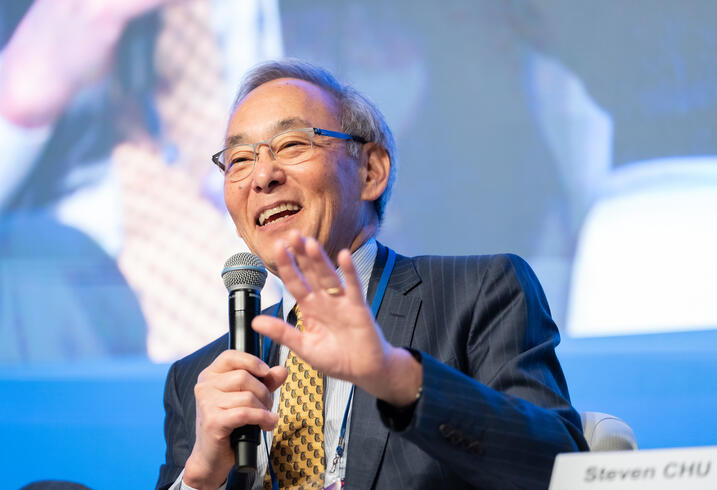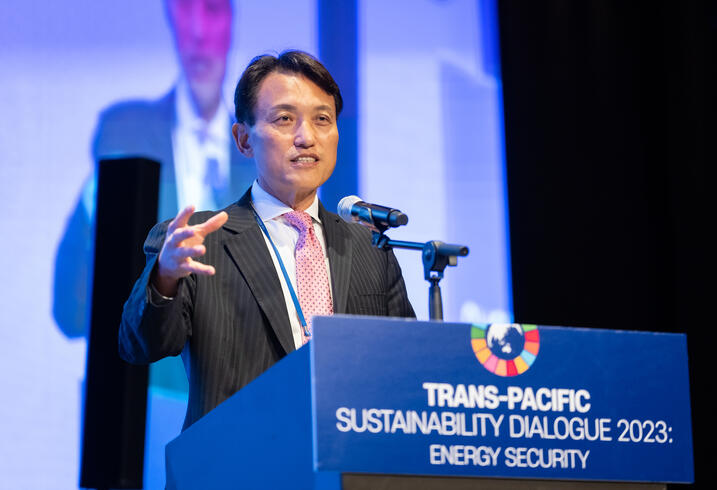Second Annual Trans-Pacific Sustainability Dialogue Aligns Researchers, Industry Leaders, and Policymakers to Propel Energy Security Solutions
Second Annual Trans-Pacific Sustainability Dialogue Aligns Researchers, Industry Leaders, and Policymakers to Propel Energy Security Solutions
The Trans-Pacific Sustainability Dialogue, a joint initiative by the Shorenstein Asia-Pacific Research Center and the Ban Ki-moon Foundation For a Better Future, convened for the second annual meeting in Seoul, South Korea, to generate new research and policy collaborations to advance energy security, the seventh of the 17 Sustainable Development Goals.

Ensuring access to affordable, reliable, sustainable, and modern energy, the promise of Sustainable Development Goal 7 of the 17 Sustainable Development Goals (SDGs) underlying the United Nations-adopted 2030 Agenda for Sustainable Development, is a cornerstone of addressing the climate crisis and ensuring the world can support the needs of future generations. Yet, at the halfway mark since the adoption of the 2030 Agenda, “the world is woefully off track to achieving the Global Goals,” according to the latest SDGs progress report.
Speaking at the opening session of the second annual convening of the Trans-Pacific Sustainability Dialogue (TPSD), Mr. Ban Ki-moon, the 8th Secretary General of the UN, who spearheaded the adoption of the SDGs framework and the Paris Climate Agreement, urged the packed audience to present a unified front to protect the promises enshrined in the SDGs. “The SDGs are by far the most ambitious and most organized plan in the history of the UN,” said Mr. Ban, chairman of the Ban Ki-moon Foundation For a Better Future. “We must achieve carbon neutrality by 2050,” he stressed. “Young people: raise your voice and tell your leaders to make sure this world remains sustainable and climate-friendly,” he challenged future generations.
APARC and the Ban Ki-moon Foundation launched the TPSD initiative to create a platform for spurring meaningful discussions, research collaborations, and policy partnerships between experts from the United States and Asia to accelerate progress on realizing the SDGs. The 2023 dialogue convening, held from September 12 to 14 in Seoul, South Korea, gathered scholars, industry leaders, and policymakers to accelerate collaborative action on energy security and sustainable energy solutions. The Korea Environment Institute, Korea Energy Economics Institute, Korea Environmental Industry & Technology Institute, K-water, and Ewha Womans University co-hosted the event, whose supporters also included the Ministry of Foreign Affairs of the Republic of Korea, the Graduate School of International Studies at Yonsei University, and the Asian Development Bank.





At the opening session, award-winning Korean actor and director Mr. Cha In-pyo, who had been named honorary ambassador of the TPSD, emphasized the necessity of unifying unlikely allies to combat the climate crisis, calling for the engagement of “artists, philosophers, and experts in the humanities” and noting that “If we can bring all our efforts together, we can make tangible progress to bring us closer to breakthrough solutions that we need.”
Throughout the first day, keynote speakers and panelists discussed innovative solutions to enhance energy security, diagnosed current barriers to sustainable energy systems, and proposed policy prescriptions to facilitate a more rapid shift toward powering the world with plentiful and affordable clean energy.
In his opening remarks, APARC director Gi-Wook Shin advocated for a collaborative approach to attaining the SDGs. Shin noted that academia and the public and private sectors must be part of governments’ action to reach the SDGs and that multi-sectoral stakeholders must work together to find new solutions. As Zandanshatar Gombojav, chairman of the State Great Hural of Mongolia, remarked during the World Leaders Session, “The younger generations have a better engagement and understanding of the issues at stake. We must work together, regardless of politics.”
In addition to Shin, the Stanford delegation to this year’s TPSD included Cheryll Alipio, APARC associate director for program and policy; Steven Chu, the William R. Kenan Jr. Professor of Physics, Molecular and Cellular Physiology, and Energy Science and Engineering, former U.S. Secretary of Energy, and 1997 Nobel Prize Laureate in Physics; APARC Fellow Thomas Fingar; Stanford Energy Postdoctoral Fellow Sang Cheol Kim; Oksenberg-Rohlen Fellow at APARC Scot Marciel, former U.S. Ambassador to Myanmar, Indonesia, and the Association of Southeast Asian Nations; Kiyoteru Tsutsui, deputy director of APARC and director of the Japan Program; and APARC Visiting Scholar Gita Wirjawan, former minister of trade and former chairman of the Investment Coordinating Board of the Republic of Indonesia.
Steven Chu also proposed innovative solutions like carbon capture, painting a portrait of the work ahead at the World Leaders Session. According to Chu, “The bad news is that we haven’t reached equilibrium with what we have put out in the environment, and it will take several hundred years to reach that equilibrium. But we can reverse the impact if we get carbon dioxide out of the atmosphere.” Listing other tangible and necessary energy solutions, Chu said: “We will eventually offload from coal and natural gas, but we need to look beyond the fossil fuel industry. We must address every facet of the greenhouse gas equation, including bolstering carbon sequestration and halting emissions — in sectors ranging from steel and cement to chemicals, plastic, food and fertilizers, and the misuse of forests — while also assisting society in accomplishing broader transformative changes.”
Following Chu and the need for transformation, Woochong Um, managing director general of the Asian Development Bank (ADB), signaled the magnitude of the financial resources necessary to reach energy security goals and recognized that “we need to transform billions into trillions in investment in the energy transition.” He described the ADB’s Finance Facility for Climate in Asia and the Pacific, a new program to mobilize climate finance at scale by providing much needed funding for climate action to ADB’s developing member countries through guarantee and grant mechanisms and creating lending headroom for new climate mitigation and adaptation projects across the Asia-Pacific region.
Speaking in a plenary session on geopolitics and energy sustainability, Scot Marciel appealed for more specific policy recommendations focused on Asia and emphasized the imperative to address energy efficiency. At a session on clean energy solutions, Joel Abraham, chief executive officer of the Fijian Competition and Consumer Commission, stated that “for a lot of people, there is no energy… The reality is different in the Pacific: the issue is about access.” Hongpeng Liu, director of the energy division of the United Nations Economic and Social Commission for Asia and the Pacific (UNESCAP), noted the necessary alignment of public needs with SDG 7 and called for the need of “a lot of investment into a just and inclusive energy environment” and for “government to take full responsibility because investment should not just be social.” As Priyantha D.C. Wijayatunga, senior director of the energy sector group at ADB contended, “Government policies should be aligned with SDGs.”
On the second day of the conference, held at Ewha Womans University, plenary sessions spotlighted the work of industry experts, scholars, and environmental practitioners. Participants discussed issues related to emerging energy-efficient technologies along with economic and political aspects of facilitating the shift to renewable energy across sectors. Eun Mee Kim, President of Ewha Womans University, argued that to create such a shift, “we should focus on a broad set of innovations across the entire energy ecosystem, including energy optimization, efficient consumption, and new energy industries.”
Celeste Crystal, director of sustainability at Samsung Semiconductor, opened the session, “Pursuit of Energy Security with Energy Efficient Technologies and Solutions,” by introducing the company’s initiatives to enhance device power efficiency to maximize energy savings through environmental “technology that makes technology sustainable.” Crystal then emphasized the collective work of stakeholders and partners to build a sustainable value chain, which was highlighted by fellow panelists, Ken Haig, head of energy and environmental policy for the Asia-Pacific region at Amazon Web Services (AWS), Ji-Hee Son, director of the Center for Institutional Innovation at the National Institute of Green Technology, and Marijn Vervoorn, director of ESG sustainability strategy at Advanced Semiconductor Materials Lithography (ASML) .
A consistent theme throughout the dialogue was thereby the role of collaboration across sectors to make substantive progress on sustainability goals and the need to ensure that emerging technologies are increasingly eco-conscious. In particular, industries that demand vast amounts of energy must research and apply more efficient energy use and management practices. While participants from multiple plenary sessions agreed that new technologies and energy solutions must operate more efficiently and rely more on renewables to help minimize global material consumption, others also advocated for caution.
In a plenary session on the political economy of renewable energy and energy security, Jin Hur, associate professor of climate and energy systems engineering at Ewha Womans University, noted a paradigm shift from a focus on energy suppliers to consumer participation. At the same time, Yao Lixia, head of energy security division at the Energy Studies Institute of the National University of Singapore, observed that “We need to be careful about the pace of the transition so that the energy supply is not disrupted.” Consequently, Naoko Ishii, professor at the Institute for Future Initiatives and director of the Center for Global Commons at the University of Tokyo, remarked that transition decisions were shaped by the “energy trilemma”: energy security, environmental sustainability, and energy equity.” Due to this energy situation, Hardy T.S. Kagimoto, chairman of the board of PowerX, Inc. advised that work must be done closely with the government, asserting that “we need a healthy dependency but it requires trust.”
Conversations throughout the Dialogue delved into how policymakers, academics, and industry can secure a sustainable future. Participants have forged new networks of scholarship and innovation throughout and beyond the Asia-Pacific region, which they will rely on to solve complex interdisciplinary problems through new research projects and thoughtful applications. The second annual TPSD builds upon the success of the inaugural Tran-Pacific Sustainability Dialogue, held in Seoul in October 2022, and the continued momentum generated through its resultant regional convening, the Trans-Altai Sustainability Dialogue, which took place in Mongolia in June 2023. Future dialogues will continue to foster intellectual collaboration and advance progress toward the SDGs.
Selected Conference Participant Reflections
- Asian Development Bank
- Institute for Climate and Sustainable Cities
- Samsung Electronics
- Celeste Crystal, Sustainability Lead, Samsung Semiconductor DSA Memory
Selected Korean Media Coverage





